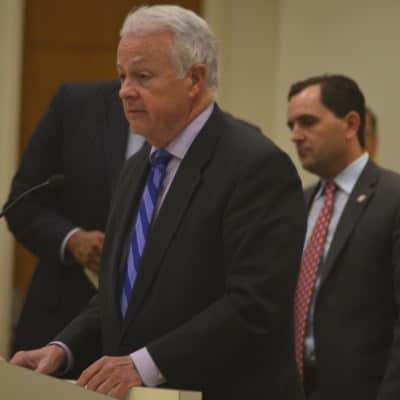

May brings flowers, Mother’s Day and college graduations. It also brings recommendations from superintendents to local boards of education for renewal of employment contracts.
And for this, I offer an employment law riddle:
Why is it that if a superintendent recommends to the local board of education that a principal’s employment contract not be renewed that a principal has a right to a board hearing1 but if the superintendent recommends that a teacher’s employment contract not be renewed, the teacher doesn’t have a right to a hearing?2
Answer: because there are more teachers.
This justification is not provided in the law but was in the corridors of the General Assembly when employment law was changed a couple of years ago, moving teachers off a path to career status and on to renewable contracts.3 After all, what other explanation could there be? That continued employment matters less to teachers? That’s not true. That teachers matter less than principals? I hope not.
There are more riddles and even stranger aspects to employment law. If the superintendent recommends that an employment contract of a principal or a teacher be renewed and the board decides to vote against the recommendation, there is no right to a hearing or other opportunity to respond to the board’s concerns. The employee simply receives notice of the board’s decision to not renew the contract.
This raises a basic question: if the superintendent supports the renewal, what is the board basing its decision on? In other words, what information is it considering to get to a different result?
This was the issue in a case decided last year by the North Carolina Court of Appeals, Tobe-Williams v. New Hanover County Board of Education. Ms. Tobe-Williams had been an assistant principal with a four-year contract. Her name was on the superintendent’s list of school administrators recommended for renewal of their contracts. At a June 5, 2012, board meeting, the board approved other recommendations but decided it wanted to take more time to decide on Ms. Tobe-Williams’ contract. Without her awareness, the board sought additional information, including a memorandum from a principal who had previously supervised her. What was interesting about this choice is that Ms. Tobe-Williams had challenged this principal and the financial practices of the school treasurer, resulting in an investigation by the school district which led to steps being put into place to make sure the treasurer met the school system guidelines. Here is how the Court of Appeals further explained it:
Indeed, even though, after a dispute arose between principal Robin Meiers and Ms. Tobe-Williams, a prior superintendent had expressly determined that Ms. Meiers should not prepare an evaluation for academic year 2008-2009, Ms. Meiers was asked to provide the Board with a memo describing, three years after the fact, what Ms. Tobe-Williams’ ratings would have been had Ms. Meiers evaluated her formally.
On July 10, 2012, the superintendent again recommended renewal of the contract. The board voted to non-renew Ms. Tobe-Williams, based in part on this memo. It was only after reaching this decision that Ms. Tobe-Williams was told of the memo and that it was placed in her personnel file. She never had a chance to rebut it.
On June 17, 2014, the Court of Appeals rejected this approach:
to allow the Board, when the superintendent has in fact recommended renewal, to conduct its own investigation, to consider documentation outside of the administrator’s personnel file, and to question witnesses without notice to the administrator, would lead to an absurd consequence that is inconsistent with “[t]he manifest purpose” of the statute to provide administrators “of proven ability for the children of this State by protecting such [administrators] from dismissal for political, personal, arbitrary or discriminatory reasons.”
This holding matters to school administrators as it provides them with at least some protection when they are not entitled to a hearing. Since teachers never have the right to a hearing (only the right to request a hearing), it matters even more for them.
To help with this employment riddle, it is gratifying to see local boards of education step up and make clear some rights of employees. In March of this year, the Wake County Schools Board of Education passed the following provision in Board Policy 3225 that applies to teachers on “renewable contracts:”
If the Superintendent recommends the contract renewal of a non-career status teacher, the Board, in considering the recommendation, may review any information in the teacher’s personnel file. If the Board determines that it needs additional information regarding a contract renewal recommendation, the Board will notify the teacher of the Board’s concerns and provide an opportunity for the teacher to respond to the concerns before reaching a decision to non-renew the teacher’s contract.
This does not seem unreasonable or too burdensome or too time-consuming. It just seems fair. A bigger issue is now with the Court of Appeals: whether the General Assembly can deprive teachers of career status after they have earned it. Oral arguments were held in February of this year and the decision should be issued in the months ahead.
In the mean time, local boards have the opportunity to consider as a part of its efforts to recruit and retain quality teachers and administrators how to solve these employment law riddles. I hope more boards will look at the work of Wake County Schools and even build upon it to create fair systems of employment.


